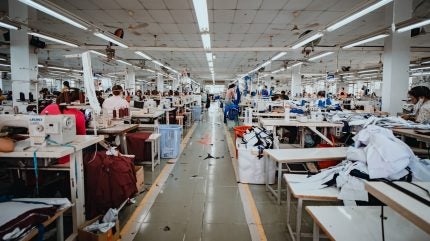
The coalition, established in 2019, consolidates the efforts of over 700 prominent entities, including brands, retailers, manufacturers, service providers, and various critical stakeholders to promote circularity within the apparel and footwear sectors.
This collaborative platform engages in technical discussions regarding upcoming regulations and mobilises its extensive network to forge cohesive stances.

Discover B2B Marketing That Performs
Combine business intelligence and editorial excellence to reach engaged professionals across 36 leading media platforms.
These collective positions are designed to exert influence on pivotal EU policies such as the Empowering Consumers and Green Claims Directives, the Omnibus proposal, and the Eco-design for Sustainable Products Regulation.
Policy Hub co-directors Marina Prados Espínola and Antoine Demarche said: “We are delighted to start a new chapter of collaboration with Better Cotton, whose broad expertise in agricultural practices and on-the-ground farm realities will strengthen our policy efforts at the European level.”
In joining this coalition, Better Cotton will contribute its insights on agricultural practices at the farm level. This contribution is aimed at bolstering recognition of cotton’s role and the significance of standards in aiding the textile industry’s shift toward sustainability and circularity.
With 40-plus members of this coalition, the cotton initiative underscores its commitment to representing a wide array of perspectives within the textile supply chain. It seeks to introduce context-specific realities into EU policy debates while underscoring cotton’s environmental and social sustainability merits as a natural fibre.

US Tariffs are shifting - will you react or anticipate?
Don’t let policy changes catch you off guard. Stay proactive with real-time data and expert analysis.
By GlobalDataBetter Cotton will also collaborate closely with other organisations such as Textile Exchange, Fashion for Good, the Social and Labor Convergence Program, the Organic Cotton Accelerator, and Fair Labor Association.
In March 2025, Better Cotton voiced its apprehensions about proposed amendments by the European Commission aimed at reducing bureaucracy and simplifying EU rules through Omnibus packages.
Some of the main concerns are that the recent narrowing of the Corporate Sustainability Reporting Directive (CSRD) and the Corporate Sustainability Due Diligence Directive (CSDDD) has led to a significant shift in due diligence obligations for companies.
The focus is now solely on direct suppliers, which marks a departure from the previous risk-based approach that aimed to identify and mitigate harms throughout the supply chain, not just at the first tier.
Additionally, the requirement for stakeholder engagement has been constrained to interactions with ‘relevant’ stakeholders — those directly associated with particular stages of the due diligence process. This change potentially excludes a broader spectrum of stakeholders, such as civil society organisations, whose insights and expertise could be instrumental in preventing and addressing adverse impacts.
Furthermore, as these directives are set to be transposed into national law by EU Member States, there will be an increased level of harmonisation across the bloc. This standardisation may reduce individual Member States’ ability to tailor these directives to their specific legal frameworks and circumstances.
In April this year, seven non-governmental organisations (NGOs), including the Clean Clothes Campaign, urged both the European Parliament and Council to dismiss the ‘Omnibus Simplification Package’ (Omnibus) proposal, claiming that the development process was executed in an undemocratic manner, lacked transparency, and was expedited.





